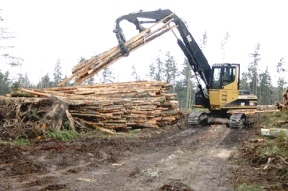HONEYMOON BAY — A clearcut logging operation of a 40-acre property south of Greenbank has left neighbors angry and frustrated over the loss of a scenic forest.
The owner of the property, however, said the logging was necessary because he has a large estate tax bill to pay.
Clearing of the property near the intersection of Honeymoon Bay Road and Classic Road intensified earlier this month. It continued this week as two massive logging cranes gathered and stacked logs this week to be hauled to an off-island mill.
Neighbors are upset that the logging began without much notice.
“Some of us have been physically sick over this,” said Jo Van Patton.
“It was a beautiful piece of property with an undulating landscape,” said Linda Bainbridge, who lives south of the logging site. “There were places the water would collect, lots of deer trails and understory plantings.”
The property is owned by DHB Enterprises, a Mukilteo-based company that owns roughly 2,500 acres of timberland in five counties. DHB received permits from the state Department of Natural Resources to log the forest.
Richard Weiss, owner of DHB Enterprises, said he is sympathetic to the neighbors and has plans to reforest the site.
He said his family is forced to harvest the timber to cover estate taxes.
The land has been in the family since his grandfather bought it in the 1960s. But when his grandmother gave the land to others in the family, they faced a daunting tax bill.
Weiss said the logging is necessary because the estate tax bill covers about 47 percent of the value of the land.
“A big tax bill is due,” Weiss said.
“We considered other areas to harvest, but the Whidbey site is flat as a table and easily accessible from the road. Some of our other forest land is on slopes,” he said.
Weiss said he lobbied to get the law covering estate taxes changed.
Weiss said he sent a letter to U.S. Sen. Maria Cantwell urging a change in estate tax laws.
“In the letter, I told her unless the law was changed we were going to do some harvesting,” Weiss said.
The logging company has a permit to log the land, issued by the state Department of Natural Resources. DHB expects to harvest 1.1 million board feet of timber from the property.
Van Patton and others don’t dispute the owner’s right to log, but they say some of the trees could have been spared.
“It would have been nice to have some selective logging done. It would have been nice to have some warning that it was going to happen,” Van Patton said. “We left town on a Tuesday and returned home Friday to find that it was almost completely logged.”
While state regulations require replanting, Van Patton said there was no comparison between 50-foot-tall trees and 2-foot-tall seedlings.
“There is nothing we can do,” she said. “It’s an exercise in frustration.”
“We didn’t have any idea that it belonged to a logging company,” said Gordon Bainbridge, adding that it had once been valuable wildlife habitat.
“There are so many deer standing on the edge of the forest at night. It’s a real loss to the area,” he said.
“Maybe if people in the area had been given an opportunity, they might have pitched in to buy the land and save those glorious trees.”
According to the state Department of Natural Resources, DHB was permitted to log the property under a state Forest Practices Class III permit. To obtain a permit, the land is first checked over by a state forester.
The permit was issued because there were no environmental resources at risk such as streams or wetlands, said Ben Cleveland, a spokesman with the department.
“Once we issue the permit, it’s up to the owner what method of logging they choose, clear cut or selective, “ Cleveland said.
Cleveland said 40 acres is the maximum size of forest that can be clearcut on an island.
Logging and forest fires are part of the natural process, Weiss said, adding that the area will be “rejuvenated” now that it has more sunlight.
“Wildlife like clearings, too, because food sources, such as wild huckleberries, flourish,” said Weiss, who graduated from the University of Washington with a degree in forestry.
Weiss comes from a family of loggers, and said his family has been stewards of forestland for generations.
“I have sawdust in my genealogy. My great-grandfather started the Buse sawmill in Everett at the turn of the century,” he said. Although they don’t have any connection to it today.
Although the change in the landscape has been dramatic to some, Weiss said a few trees have been left.
“There were no environmental issues such as a stream or wetland, and the stand was definitely mature. The alder was 50 to 60 years old, it was ripe and ready to harvest,” he said.
“It may not be obvious but we did leave a few older trees,” Weiss said.



